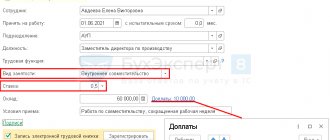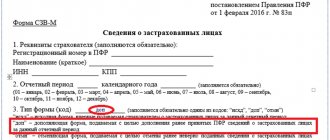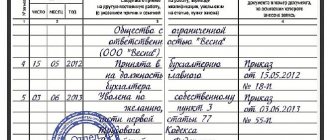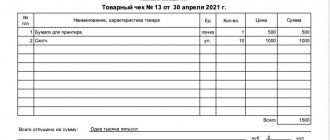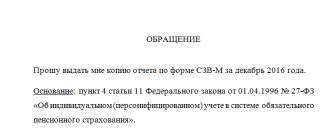Article of labor legislation regarding dismissal by agreement of the parties.
The basis for terminating an employment contract under Article 78 of the Labor Code of the Russian Federation “agreement of the parties” suggests that you can quit at any time previously agreed upon by both parties to the labor relationship.
There are a huge number of reasons that can initiate an employee’s dismissal by agreement of the parties, for example, taking another job, conflicts with company employees, etc.
An employer can also fire an employee for various reasons, if he is not satisfied with the quality of the employee’s work, it is intended to use more advanced production technologies, thereby reducing the number of employees, etc.
Something to remember! If the employment contract is terminated according to the wording “agreement of the parties,” neither the employee nor the employer is required to indicate a specific reason for dismissal.
How do they apply?
As was said, if you are dismissed during sick leave, by agreement of the parties, the date of termination of the contract does not shift. In such a situation, termination of the employment relationship occurs as follows:
- While on sick leave, the employee states in a statement his desire to terminate the employment contract on a certain day by agreement of the parties without working off.
- His boss makes a decision on this application: to agree or not. The manager may refuse to accept such an application. In this case, the employee will be able to resign of his own free will.
- Another option is for the employer to offer the employee to resign by agreement of the parties. Unlike dismissal at the initiative of the employer (Article 81 of the Labor Code of the Russian Federation), here the employee must express his consent.
- If the parties have reached mutual agreement, then they enter into an agreement in which, along with other points, the date of dismissal will be fixed.
- The employer issues an order to dismiss an employee, it must indicate that the dismissal occurs by agreement of the parties. If an employee, while on sick leave, does not have the opportunity to sign the order, the organization’s personnel employee writes the phrase: “It is impossible to get acquainted with the signature due to incapacity for work.”
Next, the employer must make a full settlement with the employee. The employee will receive all payments and compensation on the day of dismissal. It is possible to receive all payments not on this day, but on a convenient day for the employee.
If on the day of dismissal an employee is sick and cannot receive the amounts due to him, he will receive a payment the next day after contacting the employer with the corresponding requirement (Article 140 of the Labor Code of the Russian Federation).
The employee must also pick up his work book. If he does not come for his document, then the employer must either send him a notice of the need to obtain this book, or obtain his consent to send this document by mail (Article 84.1 of the Labor Code of the Russian Federation).
If a disabled worker is not able to pick up the work book on his own, then the employer sends this document by registered mail with an inventory and acknowledgment of delivery. A copy of the document remains with the organization in case the original document is lost during shipment. If the employee did not pick up the book on his own and did not give his consent to have this document sent to him by mail, then the original document is stored in the organization.
Is it necessary for a resigning employee to work out his last full day at work?
The employee retains the obligation to work the last day at the enterprise in full and in the future, leave his work duties in accordance with the requirements of the labor regulations within the organization. If the person leaving does not do this, then, as a rule, the employer will not punish for this.
Are there any separate categories of citizens who can exercise the right to resign under the article “agreement of the parties”
This article of labor law applies to absolutely all employees.
Important! When registering a dismissal by agreement of the parties, you must obtain all the necessary signatures on the documents.
What are the positive aspects for an employee upon dismissal by agreement of the parties?
– the employee has the right not to work working days upon dismissal;
– the application may not indicate the reason for your dismissal;
– with an entry about dismissal in the work book “by agreement of the parties,” the employee’s positive reputation will be preserved;
– after dismissal for this reason, the employee will have another month of work experience;
– the wording of dismissal under consideration gives the right to contact the employment center and receive benefits for some time if another job is not found.
Dismissal of an employee by agreement of the parties
Dismissal by agreement of the parties is perhaps one of the easiest to formalize. In addition, it is allowed in various situations (with different categories of employees, types of employment contracts, etc.). Let's consider when exactly it is possible to dismiss an employee by agreement of the parties and what needs to be done for this.
In what cases is dismissal possible?
By agreement of the parties, any type of employment contract (for an indefinite period, fixed-term, contract) can be terminated at any time (including during vacation or sick leave) <*>.
Almost any category of employees can resign by agreement of the parties (including pregnant women, women with children under three years of age, etc.). The employment relationship cannot be terminated by agreement of the parties with the following categories of employees:
- young specialists, young workers (employees) until the end of the period of compulsory work indicated in the certificate of assignment to work <*>;
- young specialists who have received higher, specialized secondary or vocational education under the conditions of targeted training, before the end of the work period established by the agreement on targeted training of a specialist (worker, employee);
- parents who are obliged to reimburse the costs of maintaining children, in cases provided for by law <*>;
- convicted while serving correctional labor without written permission from the penal inspection <*>.
Documenting
The initial steps to formalize the dismissal by agreement of the parties will depend on who initiates such dismissal. The law does not require a preliminary agreement to terminate an employment contract to be drawn up in writing. However, if legal disputes arise, it is better to have written documents on hand.
If the initiator is an employer. In this case, it is necessary to prepare a proposal, which is subsequently sent to the employee. The proposal can be issued in the form of a letter on the organization’s letterhead. Please note that it does not need to indicate the reason for dismissal.
Sample proposal (extract)
We propose to terminate contract No. 24 dated 06/19/2018 by agreement of the parties on 09/09/2020 in accordance with clause 1, part 2, art. 35 of the Labor Code of the Republic of Belarus.
The proposal should be presented to the employee personally against his signature or sent by registered mail with return receipt requested. The employee can give an answer to the proposal received in the proposal itself. To do this, the employer can include a line in it to express the employee’s attitude to the proposal (on consent to dismissal on the proposed or other date, or on refusal to dismiss).
Example of wording agreement in a sentence
The employee’s attitude towards termination of the contract by agreement of the parties (indicated in the employee’s own handwriting):
I agree to terminate the contract by agreement of the parties
| Signature of I.V.Ivanov 09.09.2020 |
If the initiator is an employee. To inform the employer of the desire to resign by agreement of the parties, the employee writes a letter of resignation. It indicates the expected date of dismissal, which is subsequently agreed upon with the employer. The employee is not required to justify or indicate the reasons for dismissal.
Sample application (extract)
I ask you to dismiss me on 09.09.2020 by agreement of the parties.
Having received an application from the employee, the employer (the head of the organization or other authorized official) makes a decision:
- consent to dismissal on the proposed date;
- consent to dismissal, but on a different date;
- disagreement with dismissal.
He expresses his decision in the form of a resolution in the upper right corner of the statement. The resolution includes the surname and initials of the executor (usually a personnel service employee), the contents of the order and the deadline for execution. After this, a date and a handwritten signature are affixed <*>.
Attention! If the parties have previously agreed on the date of dismissal (in response to a proposal or resolution on the application), then it will be illegal to change the decision unilaterally. In this case, in order to change the date of dismissal or cancel the dismissal, you will have to reach mutual agreement again <*>.
When the employee and employer have agreed on a dismissal date, the employer issues a dismissal order . When registering it, the requirements of the office work rules must be observed. The letter “k” <*> is added to the registration index of the order. The order must indicate:
— agreed date of dismissal;
- grounds for dismissal with reference to clause 1, part 2, art. 35 TK.
Attention! When dismissing by agreement of the parties, the order and work book cannot refer to Art. 37 TC <*>;
— the document on the basis of which the order was issued (an employee’s statement with the employer’s resolution, the employer’s proposal with the employee’s consent, or another document in which the parties expressed their consent to dismissal on a specific date).
Sample dismissal order (extract)
FIRE:
Inna Viktorovna IVANOVA, marketer of the marketing department, 09.09.2020 by agreement of the parties in accordance with paragraph 1 of part 2 of article 35 of the Labor Code of the Republic of Belarus.
Labor leave was used until 08/17/2020.
| Base: | statement by Ivanova I.V. from 01.09.2020. |
The employee familiarizes himself with the dismissal order and puts his signature on it.
The employer must make the final payment upon dismissal of the employee. That is, make all payments due to the employee on the day of dismissal (except for payments established by remuneration systems, the amount of which is determined based on the results of work for the month or other reporting period), within the following terms <*>:
- no later than the day of dismissal (as a general rule);
- no later than the next day after the employee submits a request for payment (if the employee did not work on the day of dismissal). Such a requirement can be either oral or written. However, in order to avoid controversial situations, it is advisable to ask the employee to write a written statement.
If a dispute arises between the employer and the employee about the amount of due payments, the employer is obliged to pay the employee the amounts not disputed by the employee within the time limits specified above <*>.
Payments established by remuneration systems, the amount of which is determined based on the results of work for a month or another reporting period, are made in the manner established by the LPA, no later than the day of payment of wages for the reporting period to employees of the organization <*>.
Risks
If the employer delays the final payment to the employee, the employee will have the right to recover from the employer the average salary for each day of such delay. And if the employer does not pay part of the due amount - in proportion to the unpaid amount (Article 78 of the Labor Code).
Payments that the employer is required to make include:
— salary <*>;
— monetary compensation for unused labor leave. When dismissing with compensation, the following should be taken into account: if the employee has not worked a full working year, the amount of compensation is calculated in proportion to the time worked <*>;
— other payments provided for by law, collective agreement, employment contract, LPA. For example, travel expenses, bonuses, compensation for vehicle wear and tear, etc.
Note: Upon dismissal by agreement of the parties, severance pay is not paid to the employee, unless otherwise provided by the collective agreement or agreement with the employer <*>. Please note that part-time employees are not entitled to severance pay. That is, the employer does not have the right to provide for the payment of such benefits for them, even in his LPA <*>.
On the day of dismissal based on the dismissal order, the employer (authorized official) makes an entry in the employee’s work book and puts his signature on it. The entry must comply with the wording of the order. That is, the basis and date of dismissal <*> must coincide. The entry in the work book should not contain any abbreviations (for example, “p.” instead of “item”, “st.” instead of “article”, etc.) <*>.
An example of the wording of an entry in a work book
Dismissed by agreement of the parties, paragraph 1 of part 2 of article 35 of the Labor Code of the Republic of Belarus
Note : We would like to remind you that the entry about the work of an external part-time worker is made by the employer for the main job at the request of the employee. Therefore, if an entry about hiring a part-time job was made in the work book, then an entry about the dismissal of the part-time worker should be made in it <*>.
The work record book containing the notice of dismissal must be handed over to the employee. The employer's actions will depend on whether the employee is present at work on the day of dismissal or not.
If the employee is at work. In this case, the employer should hand over the work book to the employee on the day of dismissal (last day of work) <*>. The employee signs that the work book has been received in column 13 of the book recording the movement of work books and their inserts. In it (in column 12) the employee enters the date of receipt of the work book <*>.
If the employee is not at work. Then the employer must send the employee a registered letter with acknowledgment of receipt. It indicates that the employee should perform one of the following actions <*>:
— come to receive a work book;
— give written consent to send the work book by mail. Consent is issued in the form of a statement. It indicates the address to which the work book should be sent. When sending a work book by mail, you must make a note about this in the book for recording the movement of work books and their inserts (it is advisable to indicate the date and number of the postal item) <*>.
In addition to the above, upon dismissal by agreement of the parties, the employer must take a number of actions , namely:
— make an entry about the dismissal in the employee’s personal card, if it was created and there is a place for such an entry;
- inform the military registration and enlistment office (KGB department) about the dismissal within a month (upon dismissal of a person liable for military service) <*>;
— include a copy of the dismissal order in the employee’s personal file, if one has been opened. Complete the personal file with office work and transfer it to the organization’s archives <*>;
- submit form PU-2 “Information on admission and dismissal”, containing information about dismissal <*>.
Read this material in ilex >>*
* following the link you will be taken to the paid content of the ilex service
What are the negative aspects for an employee when dismissed by agreement of the parties?
– this wording of dismissal allows you to dismiss an employee even in a situation where termination of an employment contract is prohibited by labor legislation;
– an employee will not be able to change his decision to dismiss if the application for dismissal by agreement of the parties has already been signed by the head of the enterprise;
– judicial structures with such a formulation of the reasons for dismissal always side with the employer.
What will be the amount of payment for a certificate of incapacity for work?
In a situation where an employee falls ill while still in an employment relationship with the employer, the sick leave benefit is calculated in accordance with the employee’s length of service.
How does length of service affect the amount of temporary disability benefits?
| Length of employee experience, years | Corresponding percentage of payments from the average salary, % |
| Less than 5 years | 60,0% |
| From 5 to 8 | 80,0% |
| More than 8 years | 100,0 |
Is the salary paid during care if the incapacity for work occurred on the day of payment?
Federal Law “On compulsory social insurance in case of temporary disability" dated 2006, number 255, which determines the conditions and procedure for paying sick leave, does not take into account the grounds for dismissal. They, within the framework of the issue under consideration, are not important. What then needs to be taken into account:
- the basis for the occurrence of temporary disability - what exactly happened to the employee that prevents him from engaging in work activities;
- time of incapacity for work – before or after dismissal;
- employee experience.
In Art. 5 of the said Federal Law lists cases that can be considered insured. In particular:
- the occurrence of illness or injury;
- implementation of prosthetics;
- aftercare in a sanatorium and so on.
If the parties have reached an agreement on dismissal, but it has not yet occurred, and the insured event has occurred, then the employer is obliged to pay for the period of time when the employee was on sick leave.
You can find out about the general rules for paying sick leave after dismissal by agreement of the parties here.


